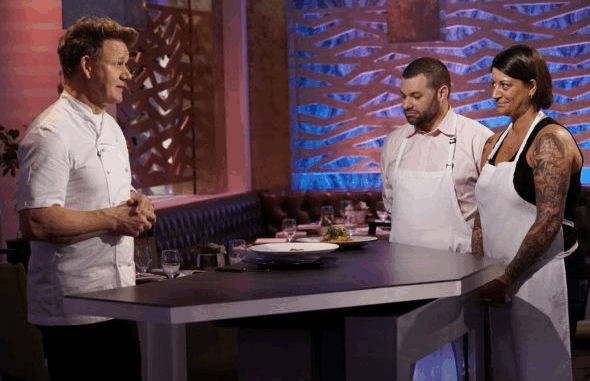
Hell’s Kitchen, the fiery battleground of elite chefs and cutthroat competition, is facing an unprecedented legal storm. One of the show’s contestants has officially filed a lawsuit against the production, claiming that a recent episode crossed a line and caused both emotional and physical harm. The allegations, though still under court review, have sent ripples of shock through the culinary television world, leaving fans and insiders wondering how a show renowned for drama could face real-world consequences.
According to the complaint, the contestant, whose identity has been kept private, alleges that during the high-pressure challenges of a recent episode, they were subjected to extreme treatment that went beyond the show’s scripted intensity. The suit details claims of verbal harassment, unsafe kitchen conditions, and psychological distress, asserting that the production team ignored repeated warnings about potential hazards. The contestant’s attorney described the situation as “a case where entertainment crossed the boundary into negligence,” highlighting the real danger behind the cameras of what is otherwise a carefully staged culinary spectacle.
For years, Hell’s Kitchen has been known for its dramatic flair: the yelling, the intense time limits, the relentless pressure that pushes chefs to their limits. But according to legal filings, this particular episode took things further than usual. The contestant claims that a series of reckless stunts during a cooking challenge led to an incident where hot liquids were spilled in a manner that caused injury. Additionally, they allege that the relentless verbal attacks, though part of the show’s signature style, became personal and damaging enough to justify legal action.
This lawsuit raises difficult questions about the line between entertainment and exploitation. Hell’s Kitchen thrives on heightened emotions, shouting, and the theatrical pressure of competition, all carefully crafted to keep viewers on the edge of their seats. Yet, when those scripted pressures translate into real-world injury or trauma, the consequences are no longer part of the show—they become legal matters. Lawyers on both sides are preparing for a battle that could have broader implications for reality television, especially in programs that push participants to extreme mental and physical limits.
Industry insiders suggest that the lawsuit could force producers to reconsider how far they push contestants in future seasons. Safety protocols, psychological evaluations, and consent agreements may all come under renewed scrutiny. This is particularly notable for a show like Hell’s Kitchen, where tension and confrontation are central to the entertainment value. Producers will have to balance the signature intensity that viewers expect with the need to protect participants from harm and legal liability.
For viewers, the lawsuit adds an unexpected layer of drama. Hell’s Kitchen has always been about watching talented chefs compete under pressure, but now the behind-the-scenes reality reveals that the heat is not just metaphorical. Social media has erupted with divided opinions: some fans defend the show’s format, arguing that participants understand the risks when they sign up, while others express concern that producers may be pushing contestants too far for the sake of television ratings.
Gordon Ramsay, the show’s outspoken host, has yet to make a public comment regarding the lawsuit. Known for his fiery temper and blunt feedback, Ramsay has always cultivated an image of intensity, but the legal scrutiny now puts that persona under a new light. Industry analysts predict that any public statements from Ramsay or the production team will need to carefully balance defense of the show’s brand with sensitivity toward the contestant’s claims.
The outcome of this lawsuit could be a turning point for reality cooking shows. While many programs thrive on competition, conflict, and high tension, the legal ramifications highlight the ethical and practical boundaries of such entertainment. Producers may be forced to reevaluate how they orchestrate challenges, supervise participants, and handle moments of potential danger—all while maintaining the drama that draws millions of viewers.

As the legal proceedings unfold, fans of Hell’s Kitchen are left to grapple with a new perspective on the show they love. Behind the shouting, the dishes, and the relentless pressure lies a complex intersection of entertainment, safety, and accountability. Whether the lawsuit results in a settlement, changes to production practices, or simply becomes a cautionary tale for reality television, it is a stark reminder that even the most scripted chaos can have real consequences.
For now, all eyes remain on the courtroom, while the kitchens of Hell’s Kitchen continue to burn, both on-screen and in the headlines. Contestants, producers, and viewers alike are witnessing an unprecedented chapter in reality television history—one where the line between drama and danger has been put under the microscope, and where the fiery reputation of Hell’s Kitchen may face its toughest test yet.